|
Featured picture tools: |
These featured pictures, as scheduled below, appeared as the picture of the day (POTD) on the English Wikipedia's Main Page in October 2011. Individual sections for each day on this page can be linked to with the day number as the anchor name (e.g. [[Wikipedia:Picture of the day/October 2011#1]] for October 1).
You can add an automatically updating POTD template to your user page using {{Pic of the day}} (version with blurb) or {{POTD}} (version without blurb). For instructions on how to make custom POTD layouts, see Wikipedia:Picture of the day.Purge server cache
October 1

|
|
Snowboarding is a winter sport that derives from skiing, sledding, surfing, and skateboarding. The snowboard attaches to a rider's feet using a special boot set onto mounted binding. Modern snowboarding began in Muskegon, Michigan, in 1965 and immediately proved to be quite popular. It has been a Winter Olympic sport since 1998. Photo: Søren Hoven
Recently featured:
|
October 2
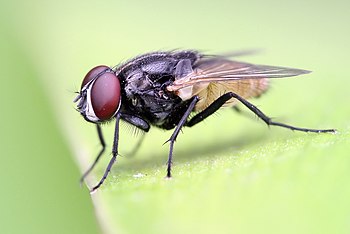
|
The housefly (Musca domestica) is the world's most common species of fly, accounting for about 90% of all flies in human habitations, and indeed one of the most widely distributed insects, found all over the world. Adult houseflies grow to 8–12 millimetres (0.3–0.5 in) long, with females being slightly larger than males. Photo: Muhammad Mahdi Karim
Recently featured:
|
October 3

|
The Mwanza Flat-headed Agama (Agama mwanzae) is a species of lizard native to Tanzania, Rwanda, and Kenya. The male's head, neck and shoulders are bright red or violet, while the body is dark blue. The female is mostly brown and is difficult to distinguish from other female agamas. Photo: Christian Mehlführer
Recently featured:
|
October 4
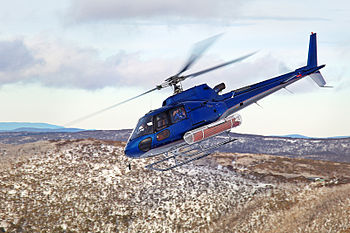
|
The Eurocopter AS350 (AStar in North America) is a single-engined light helicopter originally manufactured by Aérospatiale (now part of Eurocopter Group). It is a popular model, being used worldwide in many civilian, law enforcement, and military organisations. One variant became the first helicopter ever to land on Mount Everest. Photo: Benjamint444
Recently featured:
|
October 5

|
|
The Ratchaprasong and Sukhumvit skylines of Bangkok, the capital of and largest city in Thailand, with Lumphini Park in the center, as viewed from the Sathon District. Known in Thai as Krung Thep ("city of angels"), it became the capital in 1768 after the destruction of Ayutthaya by Burmese invaders. Photo: Benh Lieu Song
Recently featured:
|
October 6

|
The Star Finch (Neochmia ruficauda) a species of estrildid finch found in Australia. It inhabits dry grassland and dry savanna habitats. Despite its having been listed as Near Threatened in the wild it is a common aviary bird. Photo: JJ Harrison
Recently featured:
|
October 7

|
The glass house at Lal Bagh, a botanical garden in Bangalore, India. The garden was commissioned by the ruler of Mysore, Hyder Ali in 1760, and completed during the reign of his son Tipu Sultan. The glass house was modeled on London's Crystal Palace and constructed at the end of the 19th century. Photo: Muhammad Mahdi Karim
Recently featured:
|
October 8

|
Jesse Jackson (seen here in 1983) is an African American civil rights activist and Baptist minister. Jackson came to prominence with the Southern Christian Leadership Conference, working closely with Martin Luther King Jr., but he clashed with King's successor Ralph Abernathy and left the organization to form Operation PUSH. Jackson was unsuccessful in both his 1984 and 1988 attempts to win the Democratic presidential nomination. Since then, he has remained active in the African American community and is seen by many as one of America's most important black leaders. Photo: Warren K. Leffler, USN≀ Restoration: Fletcher
Recently featured:
|
October 9

|
An animated geometric proof of the Pythagorean theorem, which states that among the three sides of a right triangle, the square of the hypotenuse is equal to the sum of the squares of the other two sides, written as a2 + b2 = c2. A large square is formed with area c2, from four identical right triangles with sides a, b and c, fitted around a small central square. Then two rectangles are formed with sides a and b by moving the triangles. Combining the smaller square with these rectangles produces two squares of areas a2 and b2, which must have the same area as the initial large square. Image: Joaquim Alves Gaspar
Recently featured:
|
October 10

|
A composite photo showing the development of a green flash, an optical phenomenon that occurs at sunset or sunrise, when a green spot or ray is visible above the sun. Green flashes occur because higher frequency light (green/blue) curves more than lower frequency light (red/orange), so green/blue rays from the upper rim of the sun remain visible after the red rays are obstructed by the earth. Photo: Mila Zinkova
Recently featured:
|
October 11

|
The Qianlong Emperor was the sixth emperor of the Manchu-led Qing Dynasty, and the fourth Qing emperor to rule over China. The fourth son of the Yongzheng Emperor, his reign officially began 11 October 1735, lasting for 60 years. Named Hongli, he chose the era name Qianlong, meaning "heavenly prosperity". Although his early years saw the continuation of an era of prosperity and great military success in China, his final years saw troubles at home and abroad converge on the Qing Empire. Qianlong abdicated the throne at the age of 85, to his son, the Jiaqing Emperor, fulfilling his promise not to reign longer than his grandfather, the Kangxi Emperor. Artist: Giuseppe Castiglione
Recently featured:
|
October 12
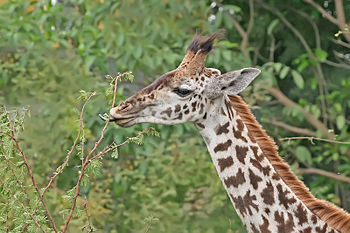
|
A giraffe extending its tongue to feed. Its tongue, lips and palate are tough enough to deal with sharp thorns in trees. Giraffes prefer trees of the genera Acacia, Commiphora and Terminalia. A giraffe requires less food than typical grazing animals, typically consuming 65 pounds (29 kg) of leaves and twigs daily, because the foliage it eats has more concentrated nutrition and it has a more efficient digestive system. Photo: Muhammad Mahdi Karim
Recently featured:
|
October 13

|
A cinder cone and lava flows from various eruptions on the flank of Mauna Loa, the world's largest shield volcano in terms of volume and area covered, and one of five volcanoes that form the Island of Hawaiʻi in the U.S. state of Hawaii. Mauna Loa has probably been erupting for at least 700,000 years, and may have emerged above sea level about 400,000 years ago. Its magma comes from the Hawaii hotspot, which is the source of the Hawaiian Islands. The Mauna Loa Observatory and the Mauna Loa Solar Observatory are both located near the mountain's summit. Photo: Mila Zinkova
Recently featured:
|
October 14

|
Mark Rutte is (as of 2011) the incumbent Prime Minister of the Netherlands. He has been the leader of the People's Party for Freedom and Democracy (VVD) party since 2006. In the 2010 general election, the VVD won the highest number of votes cast, resulting in their occupying 31 of the 150 seats in the House of Representatives. When he was sworn in on 14 October 2010, he became the first liberal Prime Minister in the Netherlands in 92 years. Photo: Nick van Ormondt
Recently featured:
|
October 15

|
The Pied Heron (Ardea picata), also known as the Pied Egret, is a heron found in coastal and subcoastal areas of monsoonal northern Australia as well as some parts of Wallacea and New Guinea. It grows to 43–55 cm (17–22 in) long, with dark slate grey wings, body, and crested head, with a white throat and neck. The weight ranges from 225 to 280 g (8 to 10 oz), with males being heavier than females. Photo: JJ Harrison
Recently featured:
|
October 16

|
The dwarf yellow-headed gecko (Lygodactylus luteopicturatus) is a small gecko species native to the rocky areas of southern Kenya, eastern Tanzania, and Zanzibar. This individual's tail, which had been shed through autotomy, is regenerating. Photo: Muhammad Mahdi Karim
Recently featured:
|
October 17

|
|
With its 54 inhabitants, Naajaat is one of the smallest settlements in the Qaasuitsup municipality of northwestern Greenland. There are no shops in the settlement. The blue building to the left is used as a church, school, and village hall. Icebergs calve off from the Greenland ice sheet, seen to the left, 22 km (14 mi) away, and drift past the settlement. Photo: Slaunger
Recently featured:
|
October 18

|
One Plectroctena sp. ant attacks another of its kind to protect its territory. Plectroctena ants belong to the Apocrita suborder, which also includes wasps and bees. Members of Apocrita are characterized by the narrow "waist" (petiole, seen here directly behind the rear leg on the right ant) formed between the first two segments of the actual abdomen; the first abdominal segment is fused to the thorax, and is called the propodeum. Photo: Muhammad Mahdi Karim
Recently featured:
|
October 19

|
Alpine heathland—dwarf-shrub habitat found on mainly low quality acidic soils—at High Shelf Camp near Mount Anne in the Australian island of Tasmania. Heathlands of Australia are home to some 3,700 endemic or typical species in addition to numerous less restricted species. Photo: JJ Harrison
Recently featured:
|
October 20

|
A man engaging in big wave surfing at Mavericks, located just north of Half Moon Bay, California. Big wave surfing is a discipline within surfing in which experienced surfers paddle into or are towed onto waves which are at least 20 ft (6.1 m) high, and is a hazardous activity, as surfers can be pushed far beneath the surface of the water after a wipeout. Photo: Shalom Jacobovitz
Recently featured:
|
October 21

|
Crumbling scoria cliffs surround the rift at the summit of Mount Tarawera, a volcano near Rotorua in New Zealand's North Island. This 500 m (1,600 ft) wide rift was created in 1886 in the country's largest historical eruption. The famed Pink and White Terraces were lost during the eruption, and over one hundred people were killed. Photo: Avenue
Recently featured:
|
October 22

|
A nugget of platinum, a dense, malleable, ductile, precious, gray-white transition metal. It is one of the rarest elements in the Earth's crust. It exhibits a remarkable resistance to corrosion, even at high temperatures, and as such is considered a noble metal. As a result, platinum is often found chemically uncombined as a native metal. Photo: Alchemist-hp
Recently featured:
|
October 23

|
A Swamp Wallaby (Wallabia bicolor) joey. The Swamp Wallaby is found along the entire east coast of Australia. It was formerly found through to south-eastern South Australia, but is now rare or absent from that region. It inhabits thick undergrowth in forests and woodlands, or shelter during the day in thick grass or ferns, emerging at night to feed. Photo: Benjamint444
Recently featured:
|
October 24
|
A panoramic image showing the former mill town of Burnley in Lancashire, England. To the far top left of the image is the imposing Pendle Hill, with the Yorkshire Dales visible in the top central background. The left of the image shows the town centre and Turf Moor, home of Burnley Football Club, can be seen in the centre of the picture. To the right the areas of Brunshaw and Pike Hill can be seen. All of the town's 11–18 education facilities have recently been replaced and two of the construction sites can be seen, one behind the football stadium and the other in the foreground to the right of the image. Photo: Childzy
Recently featured:
|
October 25

|
A crab of the species Carpilius convexus (left) feeding on a slate pencil urchin. Crabs are omnivores, feeding primarily on algae, and taking any other food, including molluscs, worms, other crustaceans, fungi, bacteria and detritus, depending on their availability and the crab species. For many crabs, a mixed diet of plant and animal matter results in the fastest growth and greatest fitness. Photo: Mila Zinkova
Recently featured:
|
October 26
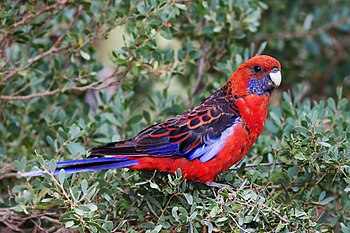
|
The Crimson Rosella (Platycercus elegans) is a parrot native to eastern and south-eastern Australia which has been introduced to New Zealand and Norfolk Island. It grows to about 36 cm (14 in) long, much of which is tail, with males larger than females. Of the five subspecies, two are not actually coloured crimson. Photo: JJ Harrison
Recently featured:
|
October 27

|
Big (right) and Small are the two main characters of Big & Small, a British puppet-based children's television series aimed at preschool children. Both characters are voiced by comedian Lenny Henry in the UK version. In total, over 40 channels worldwide feature the show. Photo: Christos Kalohoridis, Kindle Entertainment
Recently featured:
|
October 28
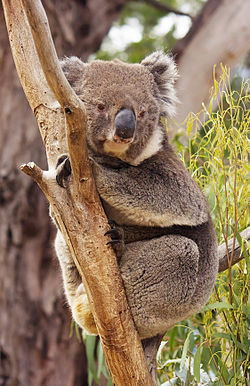
|
A female koala (Phascolarctos cinereus), an arboreal herbivorous marsupial native to coastal regions of eastern and southern Australia. The word "koala" comes from the Dharuk word gula. English-speaking settlers from the late 18th century first called it "koala bear" due to its similarity in appearance to bears, although they are not at all related. Instead, its closest living relative is the wombat. Photo: JJ Harrison
Recently featured:
|
October 29

|
The Paper Kite (Idea leuconoe) is a species of butterfly native to Southeast Asia. Also known as the Rice Paper or Large Tree Nymph butterfly, this species is noted for its presence in butterfly greenhouses and live butterfly expositions. Photo: Pro2
Recently featured:
|
October 30

|
|
A scene from the Ramayana, an ancient Sanskrit epic. Depicted here are several stages of the War of Lanka, with the monkey army of the protagonist Rama (top left, blue figure) fighting the demon army of the king of Lanka, Ravana, to save Rama's kidnapped wife Sita. The three-headed figure of the demon general Trisiras occurs in several places – most dramatically at the bottom left, where he is shown beheaded by Hanuman. Artist: Sahibdin
Recently featured:
|
October 31

|
An écorché (flayed figure) of a horseman and his horse, prepared by anatomist Honoré Fragonard and on display at the Musée Fragonard d'Alfort in Paris. Fragonard was the first professor of anatomy at the École nationale vétérinaire d'Alfort (National Veterinary School of Alfort) and prepared thousands of anatomical pieces. In 1771, after six years of teaching, he was dismissed from his post for being a "madman". Photo: Jebulon
Recently featured:
|
Picture of the day archives and future dates
